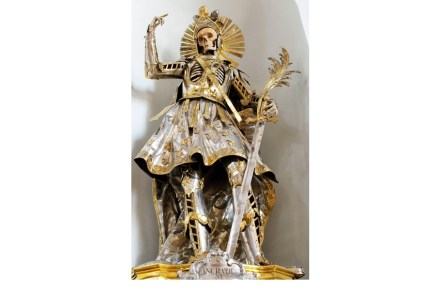Bad timing | 6 January 2012
Since corrected, but an embarrassing end to an embarrassing week for Ed Miliband: And RIP Bob Holness, the second James Bond. Hat-tip for the screengrab: Mark Wallace

Since corrected, but an embarrassing end to an embarrassing week for Ed Miliband: And RIP Bob Holness, the second James Bond. Hat-tip for the screengrab: Mark Wallace

So Lord Falconer’s commission, funded by Sir Terry Pratchett, has concluded that there is a ‘strong case’ for assisted suicide, has it? Well, there’s a thing. Given their previous form and the composition of the committee, it would have been remarkable if they’d decided that, on balance, the law works perfectly well — which is what one of their witnesses, the Director of Public Prosecutions, Keith Starmer, said. On the whole, partly because some anti-euthanasia bodies refused to participate and partly because people with a blatant opposition to assisted dying weren’t invited to sit on it, the composition and conclusions of the body reflected the opinions of those who set

The photographs and video footage show North Koreans weeping in their hundreds at the news of Kim Jong-il’s death. But the departed leader, immortalised by Team America as a song-prone loner, remained a mystery to both his people and outsiders alike. He came to power after his father, North Korea’s founder Kim il Sung, died in 1994. Reliable biographical information about him is scarce. He rarely appeared in public and his voice was seldom broadcast. What’s certain is that he spent lavishly on both luxuries and a nuclear programme, while millions of North Koreans starved. Kim Jong-il’s death comes at an awkward moment. North Korea had just agreed to
The playwright who became a protestor who became a president, Vaclav Havel, has died today. There is already much on the blogosphere about this Czech great, and there will be more in tomorrow’s papers. But if you only read one thing connected with him, then I’d advise you make it the address he delivered to the Czechoslovakian people on 1 January 1990, which I’ve copied below. It was only a few days after his election as president, yet triumphalism and celebration is there little. Instead, Havel dwells on the horrors his country endured in the Twentieth Century, and — crucially — how they were permitted to come about. It is

This is a raw, untidy, ragged book. Well, grief is all of those things. On the other hand, Didion wrote about the death of her husband in an iconic memoir, A Year of Magical Thinking, which apart from being raw was none of them. So she knows how it can be done. That book was about the horribly sudden death of her husband, about shock and pain and then the confusion of bereavement and loss. But it was also a vivid portrait of the man himself. ‘One never knows when the blow may fall’, yet people have been surprisingly surprised that it fell again so quickly on Didion, when her
In one Capuchin monastery in Sicily, the so-called Palermo Catacombs, locals used to buy a niche where their mummified corpse would one day stand erect, clothed and on display to visitors, the way we might now buy a burial plot. Would-be purchasers would pay a visit to select their niche and stand in it to make sure it fitted. Indeed, by way of voluntary penance, some would remain there for hours, contemplating their end. At the same time, in the early 17th century, a related order of nuns in Rome, the Sepolta Vive or Buried Alive sisters, would sleep in coffins and hail each other with the observation: ‘Remember sister,

The good news is that Rod Dreher is blogging again, this time at the American Conservative; the sad news is that his sister Ruthie, pictured above with her daughter Claire, has just been killed by cancer. Rod – we email-know one another and have at least one good friend in common – has been blogging about the reaction to his sister’s death. It is, as it must be, emotional, passionate stuff. There’s no pressing need for me to write about this, I guess, save that blogging is most often a means of expressing frustration or unhappiness or outrage and it is not often that we – that is, people who
If you were stranded on a desert island, Ruth Leon would be the perfect companion. She is plucky, resourceful, funny, bright and indomitable: you can see just why the late theatre critic Sheridan Morley fell in love with her. And indeed he did find himself alone with her, on the mental-health equivalent of a desert island, when an otherwise fairly mild stroke seemed to ossify his pre-existing depression. For four years he spent as many hours a day as he could asleep. When he was awake he was either weeping or complaining. I lost count of how many times the word ‘whining’ appears in this book. By her own admission, Leon
As the nation heads for the ballot boxes today, it might spare a moment of reflection for Claude Stanley Choules. The last surviving combat veteran of the first world war, born 110 years ago in Worcestershire, died earlier this morning at his residence in Australia. It leaves Florence Green — who served in a non-combat role as a mess-waitress — as the only remaining veteran of that great and terrible conflict. No doubt, our collective memory is weaker for Mr Choules’ death. But our country is stronger, more secure, for his life. An election, by whatever voting system, seems an apt sort of memorial to his passing.
The death of the Polish-born British novelist Joseph Conrad is the central event of David Miller’s debut novel. The death of the Polish-born British novelist Joseph Conrad is the central event of David Miller’s debut novel. A reimagining of Conrad’s final days, Today explores the nature of bereavement. Within the novel’s confines, Conrad exists simply as a character — a dying man whose profession has been that of a writer and whose working life has necessitated the presence of a secretary, Lillian Hallowes, who, up to a point, offers the reader a commentary on the novel’s happenings. Miller attempts no assessment of Conrad’s work, his literary status or psychology. In
This book reads like an interesting after- dinner conversation between intelligent friends. That said, it is a rambling conversation, and although it is extremely entertaining, it does not add up to much. Its ostensible subjects are two instances of scientific intelligence being brought to bear on the possibility of defying, or surviving, death. In the first case, John Gray investigates those, such as Freddie Myers and Henry Sidgwick, who formed the Society for Psychical Research. In the second instance, Gray tells again the bizarre story of the cult of Lenin, and Leonid Krasin’s belief that, if Lenin’s body could be kept in a state of cryonic suspension, there might dawn
Pete Postlethwaite, with whom, sadly, I never worked, belonged to that group of journeymen actors who command the respect and admiration of their peers but are denied the wider honours until death claims them. How amazed he would have been by the enormous photograph that graced the front-pages of the newspapers — his unique, craggy face that had never known botox or cosmetic surgery, displaying more character than many of his more vaunted fellow thespians. It is sometimes forgotten that an actor’s career is more often than not sculptured in snow and disappears so quickly when he or she is removed from public view, for it is an inescapable fact
If one asks Albanians who is their greatest living writer, the immediate answer is Ismail Kadare, winner of the inaugural Man Booker International Prize in 2005. But the tone of any discussion that follows is all too often grudging or even hostile. The books themselves are hugely popular, their author far less so. The reason for this is that throughout a period when many Eastern European writers were suffering persecution for their opposition to Stalinist regimes, the worst that ever happened to Kadare was an embargo on his work for three years. A Marxist, he managed to remain on friendly terms with the Albanian dictatorship until two months before the

A fascinating and typically well-written piece by Kerry Howley about cryonics and death, published in the New York Times Magazine last week. It begins well and gets better: There are ways of speaking about dying that very much annoy Peggy Jackson, an affable and rosy-cheeked hospice worker in Arlington, Virginia. She doesn’t like the militant cast of “lost her battle with,” as in, “She lost her battle with cancer.” She is similarly displeased by “We have run out of options” and “There is nothing left we can do,” when spoken by doctor to patient, implying as these phrases will that hospice care is not an “option” or a “thing” that
Unusually for a work of fiction, Tim Pears’ new novel opens with a spread of black-and-white photographs, part of an ‘investigator’s report’ into a fatal collision said to have taken place on a Birmingham dual carriageway in the summer of 1996. Unusually for a work of fiction, Tim Pears’ new novel opens with a spread of black-and-white photographs, part of an ‘investigator’s report’ into a fatal collision said to have taken place on a Birmingham dual carriageway in the summer of 1996. The victim is a six year-old girl named, Sara Ithell. Her father, 35 year-old, Owen, loses both his right hand and his livelihood as a jobbing gardener to

The title of Jon McGregor’s third novel derives from an anecdote told by one of the many vivid, dispossessed characters whose voices burst from its pages: Steve is a homeless ex-soldier who agrees to help deliver a lorry-load of aid to a Bosnian town, but is turned back on the grounds that ‘even the dogs’ there are dead. The title of Jon McGregor’s third novel derives from an anecdote told by one of the many vivid, dispossessed characters whose voices burst from its pages: Steve is a homeless ex-soldier who agrees to help deliver a lorry-load of aid to a Bosnian town, but is turned back on the grounds that

The former Labour leader Michael Foot died today, aged 96. A man whose politics I doubt many CoffeeHousers will share, and whose period in charge of the Labour party might not be remembered with much fondness by those who do. But his commitment, integrity and intelligence still stand as a bright, clear example to politicians today. I’d recommend you read the warm and thoughful tributes from Tom Harris, Jon Snow, Dan Hannan, Sunder Katwala and Alastair Campbell, among others.

For those unfamiliar with Martin Amis’s short story, ‘What Happened to Me on My Holiday’, written for The New Yorker in 1997, it was a purist exercise in autobiographical fiction; not even the names were changed. For those unfamiliar with Martin Amis’s short story, ‘What Happened to Me on My Holiday’, written for The New Yorker in 1997, it was a purist exercise in autobiographical fiction; not even the names were changed. The Pregnant Widow is a far more complex, troubling piece of work. Amis did indeed spend much of the summer after his second year at Oxford in a castle near the Mediterranean, though not in Tuscany; that would
